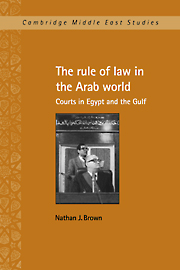Book contents
- Frontmatter
- Contents
- Preface
- Glossary
- 1 Arab courts in comparative perspective
- 2 The creation and operation of the modern Egyptian legal system, 1876–1937
- 3 Egyptian courts., 1937–1971: centralization, authoritarianism, and socialism
- 4 Egyptian courts, 1971–1996: the reemergence of liberal legality
- 5 Legal reform in the Arab states of the Gulf
- 6 The legal system and the rule of law in Kuwait and Qatar
- 7 Popular uses of the courts
- 8 Business and the courts
- Conclusion
- Bibliography
- Index
5 - Legal reform in the Arab states of the Gulf
Published online by Cambridge University Press: 23 October 2009
- Frontmatter
- Contents
- Preface
- Glossary
- 1 Arab courts in comparative perspective
- 2 The creation and operation of the modern Egyptian legal system, 1876–1937
- 3 Egyptian courts., 1937–1971: centralization, authoritarianism, and socialism
- 4 Egyptian courts, 1971–1996: the reemergence of liberal legality
- 5 Legal reform in the Arab states of the Gulf
- 6 The legal system and the rule of law in Kuwait and Qatar
- 7 Popular uses of the courts
- 8 Business and the courts
- Conclusion
- Bibliography
- Index
Summary
In the Arab states of the Gulf, legal reform took place in a very different international and domestic setting from that prevailing in Egypt over the past century. The imperial influence was greater (thus the likelihood of imposed law should have increased). Additionally, the forces for liberal legality were weaker. Yet if the historical experience of Egypt over the past century is any guide, the adoption of European-style legal systems – and legal reform more generally – cannot be explained primarily in terms of imperial imposition or liberal legality. While imperialism was hardly irrelevant to the Egyptian experience, the European presence at most set the context for a series of far-reaching reforms that was pursued for independent reasons by an ambitious, centralizing Egyptian political elite. And while the system adopted had several characteristics of liberal legality, it could also be accommodated to a variety of political systems. To be sure, the lawyers and judges of Egypt's National Courts were always one of the strongest forces advocating liberal legality, but they also posed few obstacles to (and occasionally have facilitated) unchecked executive authority.
One would expect that the Arab states of the Gulf would have been both more susceptible to imperial pressure and more suspicious of institutions associated with liberal legality. The British presence excited less nationalist opposition (with the possible exception of Bahrain) and came at a time when the administrative structure was far more rudimentary than in Egypt. And the regimes of the Gulf have been unabashedly autocratic; with the exception of short periods in Bahrain and much longer periods in Kuwait, liberal democratic institutions and practices have generally not even existed on a nominal level.
- Type
- Chapter
- Information
- The Rule of Law in the Arab WorldCourts in Egypt and the Gulf, pp. 129 - 156Publisher: Cambridge University PressPrint publication year: 1997
- 1
- Cited by



